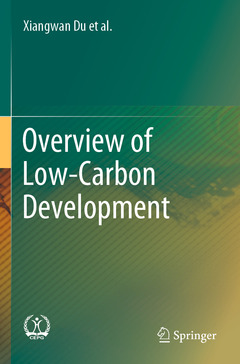Overview of Low-Carbon Development, 1st ed. 2020
Auteurs : Du Xiangwan, Zhou Dadi, Chao Qingchen, Wen Zongguo, Huhe Taoli, Liu Qiang

Prof. Du was elected member of CAE in 1997 and foreign member of Russia Academy of Engineering Science in 2006. He has been vice president of CAE since 2002 and has played a leading role in the consulting work on China’s energy development strategy such as Research on China 2020 Renewable Energy Development Strategy, Research on China Energy Medium and Long Term (2030, 2050) Development Strategy and Re-consideration of Nuclear Energy Development, etc. He is currently the deputy head, National Energy Expert Advisory Committee.
Prof. Du has participated in addressing climate change. He has been in charge of the study of scientific and technologic issues concerning addressing climate change. He is the honorary director of the National Expert Committee of Climate Change. He was advisor of Chinese Delegation to COP UNFCCC at Copenhagen, Durban, Doha, Cancun, Warsaw and Paris where he elaborated on efforts China needs to make in carbon intensity reduction and presented China’s determination in active commitment and achievement of goals in terms of energy.
Prof. Du was honored with one top prize, one first prize and two second prizes of the National Award for Science and Technology Progress and dozens of ministry- and commission-level first and secondpriz
Date de parution : 10-2020
Ouvrage de 339 p.
15.5x23.5 cm
Date de parution : 10-2019
Ouvrage de 339 p.
15.5x23.5 cm



